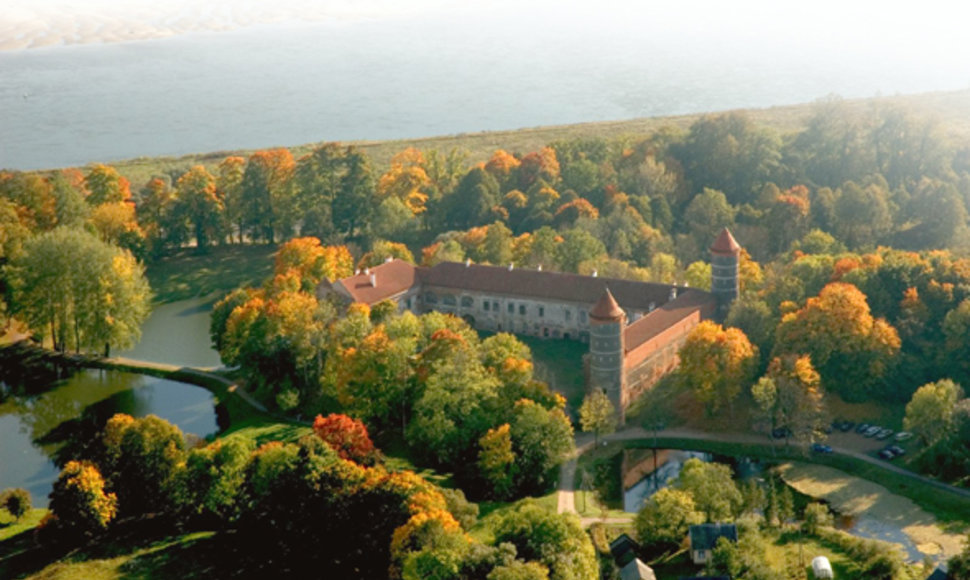Meanwhile both authorities and entrepreneurs of Tauragė daydream about heavy industry and generous investors, yet their visions of how to make it happen somewhat diverge.
Migration en masse
The town of Tauragė in south-west of Lithuania meets visitors with a greyish block of residential houses. But the first impression can be deceptive – as one moves towards the centre, advertising banners, shops, and colours become increasingly abundant. There are over a dozen outlets of major retail chains, competing with a multitude of smaller corner shops. There is no shortage of clients for them all. A second-hand clothing shop – the likes of which are still signifying relative poverty and adorn many a street in capital Vilnius – looks somewhat out of place here. Moreover, buying a flat in Tauragė can set you back no less than in a bigger city.
Grocery chains Maxima, Iki, and Norfa are expecting a new competitor to enter the market soon – Germany's Lidl is to open an outlet opposite the coach station. The low-price chain also alarms small businesses who prefer not to have a big supermarket in the town centre.
When I make an observation that with this multitude of shop signs Tauragė can easily claim a place among Lithuania's major towns and it seems absolutely thriving, two students of Tauragė Department of Kaunas College smirk: “What's so thriving here?”
Almost every family in Tauragė has been touched by emigration. In 2001, the population of Tauragė District was 52.7 thousand; last year, under 44 thousand. “Almost everyone of my family left for England: my parents, then sister with her family followed suit, brother. I alone stayed,” one girl volunteers.
She was a member of an electoral commission during the recent Seimas elections. The official electoral roll in Šilgaliai village was 600 voters, even though only half that number actually reside there. Tauragė Department of Kaunas College used to have over 500 students and three study programmes, whereas now there remains but one.
Legal gas only for company cars
Another misfortune that plagues Tauragė even more than emigration is smuggling. When I ask the students how many people in Tauragė will fill up in pump stations, they reply unwaveringly: “Only companies.” One teacher confesses that her car runs almost exclusively on Russian gas. One litre of smuggled diesel fuel costs 3.7 litas (1.07 euro) or half a litas less than in a pump station.
Everyone with the means to travel do not hesitate to go 40 kilometres to Sovetsk in Kaliningrad to shop for fuel as well as tobacco, alcohol, sugar, medicine, and, until recently, clothes (the prices have gone up recently, though). Those without the means buy smuggled fuel from dealers. “International business if there is one,” grins the teacher who lectures her college students on none other topic than international trade.
Officially, travelers are allowed to bring only two packs of cigarettes from Russia. But circumventing the regulation takes little ingenuity – a person of bulky constitution can easily unwrap the cigarettes and attach them to the belly underneath his or her clothes.
Border guards readily point out that after installing security cameras along the river Nemunas, which marks the Lithuanian-Russian border, smuggling nearly ceased. The students in Tauragė, however, are unconvinced. The cameras, they say, might have tamed small-time smugglers and their underage accomplices, but the big shots continue their operations uninterrupted. And if they get busted occasionally, it is not the “fault” of law enforcement officers: “Whenever they [smugglers] fall out with one another, there comes the news that some truck loaded with cigarettes got seized.”
A few weeks ago, in a debate on business opportunities in Tauragė, town mayor Pranas Petrošius swore the black trade was receding, even though it still depressed local income. “Smuggled cigarette traffic certainly does not go through Tauragė,” agreed his son Darius who was recently elected to parliament. His words, however, sent the audience into laughter.
Renaldas Malychas, head of the local paper Tauragės Kurjeris, adds that the town is a haven for semi-legal trade in used cars: “Take a trip to any selling point and observe the price that is put in the purchase contract.” Not every deal warrants paperwork in the first place.
Little motivation to work
According to surveys, people in Tauragė county are outstandingly tolerant towards smuggled goods. “This is bad both for businesses – as it creates unfair competition – and residents,” says senior economist at Swedbank Vaiva Šečkutė. “People are locked in a vicious circle: earning small income, they choose illegal goods and thus save some money, but it is this kind of behaviour that prevents their income from rising.”
She sees a direct link between the black market and poor economic performance. Tauragė still has one of the biggest unemployment rates in the country. About 40 percent of the registered unemployed are unskilled labour.
Director of Tauragė labour exchange Mindaugas Macas admits that he observes more and more people who are not ready nor willing to work signing up with the labour exchange. Some of them lack skills but not motivation – in that case, the person is sent to a training programme. Many, however, only come so they can claim their benefits. “I've had clients who used to work as drivers or lathe operators, but have not been employed anywhere since 1990,” he says.
There are people claiming benefits despite earning decent wages abroad. Macas recently failed to persuade a group of migrant workers from Norway to take up jobs – they did not come back to Lithuania to work, they said, but merely to visit their wives.
On 1 November, unemployment in Tauragė county was 11.4 percent. In Tauragė District, 12.8 percent. Every fourth resident works in the private sector and every tenth is a state employee. A disproportionate number of hired vis-a-vis self-employed workers testifies to a low level of entrepreneurship – according to the statistics by the Lithuanian Industrialists Confederation, only 1 to 2 percent run their own business.
Even though employment in Tauragė has been edging up for the last three years, there are other disconcerting trends in demographics, notes Dr. Arūnas Pocius of the Labour and Social Research Institute. A decade ago, children outnumbered the elderly, while it is the other way round now (15 and 17 percent respectively). Compared to 2001, the population of Tauragė District contracted by one sixth – to 43 thousand. 33 thousand of them reside in the town of Tauragė.
Businesspeople at clashes with mayor
Under the Soviets, Tauragė District boasted big industry and was home to four major factories. These, however, collapsed along with the Soviet Union. Small and mid-scale businesses sprang up on their ruins.
Tauragė Mayor Petrošius has ambitious plans: a recreation centre complete with gyms, a pool, and a cinema; rebuilding infrastructure in residential quarters; drainage system in the industrial quarter.
Local businesspeople, however, are skeptical. “The authorities prioritize rebuilding the town centre and infrastructure, which will not result in long-term added value,” says Darius Stankus, leader of Tauragė County Business Association. “A businessman does not begin a business with a façade. Of course, it is important to clean up town squares, but who is going to promenade in them?”
Stankus believes it is more important to draft a development strategy for the town and promote Tauragė among foreign investors. The town does have an edge: work efficiency 2.5 times higher than in Sweden and significantly lower labour cost.
Mayor Petrošius promises a number of exemptions for entrepreneurs: a young investor who is employing at least half of his or her workforce locally is to be exempted from property and land taxes for three years.
According to Darius Petrošius, the mayor's son, Tauragė supports businesses financially, too. The town singles out 20 thousand litas a year for that purpose and a new enterprise can get a subsidy of up to 400 litas (116 euros). “It might sound ridiculously little, but it is a sign of attention,” the new MP says.
“400 litas is very good. If, on the other hand, it were 100 thousand, they would simply drink it away,” comments Journalist Union chairman Dainius Radzevičius dismissively. “They'd better cut EU support – it will make us think. Otherwise, we will only raise a second generation of homo sovieticus. Neat sidewalks and street lamps will not build an industry.”
The students in the streets of Tauragė confirm that great many private initiatives end up collecting dust in municipal drawers. The authorities, they say, only work to improve the image of the region: “The streets are neat, they are building infrastructure, new buildings, using EU money, but this does not create any long-term perspective for the town,” they summarize.
Lowest salaries
Of the ten administrative counties of Lithuania, Tauragė county has the lowest average monthly wages, 1,736 litas (503 euros. The national average is 2,153 litas; in Vilnius county, 2,415 litas).
Industrial production in the county accounts for 22 percent of its GDP (40 percent in Utena county; 25 percent nation-wide). It totals 2.2 billion litas – mere 2 percent of national GDP. Even though Tauragė county is not the smallest one, its GDP per capita share is among the most modest – 19.8 thousand litas (the national average is 35 thousand litas).
Last year, it was dead last in terms of export (432.4 million litas or 3.95 thousand litas per capita). It also lagged behind in direct foreign investment, 41.34 million or 424 litas per capita. Utena county, which is second-last, did four times better while the national average stood at 29.6 thousand litas.
Gross fixed investment in Tauragė totaled 2,713 litas last year (Panevėžys county ranked second-last with 3,343 litas). Tauragė county has been lagging behind all others since 2008, even though the gap narrowing.













